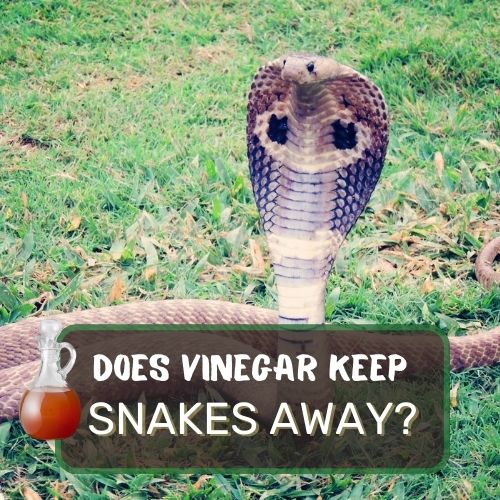
Curious about the age-old question, “Does vinegar keep snakes away?”
In this article, we delve into the fascinating realm of snake repellents and explore the potential efficacy of vinegar as a deterrent.
Unpacking the intricacies of snake behavior, we examine the interactions between vinegar and their senses, shedding light on the topic from an analytical perspective.
We address common myths, offer insights from experts, and present experimental findings to provide a comprehensive view.
By the end, you’ll gain a clear understanding of the pros and cons of using vinegar, along with a broader knowledge of holistic snake prevention methods.
Discover the truth behind this natural remedy and equip yourself with valuable information for harmonious coexistence with these enigmatic creatures.
Table of Contents
- 1 Does Vinegar Keep Snakes Away? (Short Answer)
- 2 Understanding Snake Behavior and Repellents
- 3 Vinegar as a Snake Repellent: What the Experts Say
- 4 The Sense of Smell in Snakes and How It Relates to Vinegar
- 5 Effectiveness of Vinegar in Repelling Snakes: Case Studies and Experiments
- 6 Other Natural Snake Repellents and Preventive Measures
- 7 Safety Considerations and Precautions when Using Vinegar as a Snake Repellent
- 8 Other Methods for Snake Control and Removal
- 9 Debunking Myths and Misconceptions
- 10 Frequently Asked Questions about Vinegar and Snake Repellents
- 11 Conclusion
Does Vinegar Keep Snakes Away? (Short Answer)
The effectiveness of vinegar in repelling snakes is a topic of debate. Some individuals claim that the strong smell of vinegar deters snakes from certain areas, while others question its consistent impact. While there are anecdotal accounts of vinegar’s success as a snake repellent, scientific evidence supporting its reliability is limited. Snakes rely heavily on their sense of smell, and while vinegar’s scent might disrupt their sensory perception, its actual effect on snake behavior can vary among species.
As of now, more research is needed to definitively establish vinegar as a reliable snake repellent.
Understanding Snake Behavior and Repellents

Snake Behavior and Habitat Preferences
When it comes to understanding whether vinegar can keep snakes away, it’s essential to delve into the world of snake behavior. Snakes are fascinating creatures with a wide variety of species, each having its own unique characteristics and preferences.
Most snakes are shy and prefer to avoid humans and larger predators. They tend to thrive in environments where they can find shelter, warmth, and a stable food source.
Understanding their habits and preferences is key to finding effective repellent solutions.
Common Types of Snake Repellents
Before we dive into the specifics of vinegar as a snake repellent, let’s explore the array of methods people have tried to keep these slithering creatures at bay.
Traditional snake repellents include chemical sprays, electronic devices emitting vibrations or sounds, and physical barriers like fences.
Each method aims to disrupt the snake’s comfort zone and discourage them from entering a certain area. But how effective are these methods, and where does vinegar fit in?
How Snake Repellents Work
Snake repellents work by triggering the snake’s senses in a way that makes the area unappealing or unsafe for them. Chemical repellents often release strong odors that snakes dislike, encouraging them to avoid treated areas.
Electronic devices mimic the vibrations caused by potential predators or disturbances, causing the snake to perceive a threat. Physical barriers, like fences, serve as a direct obstruction, deterring snakes from crossing into unwanted territory.
Vinegar as a Snake Repellent: What the Experts Say

Expert Opinions on Vinegar as a Snake Repellent
Now, let’s get to the heart of the matter: can vinegar really keep snakes away? Expert opinions on this topic vary. Some homeowners swear by vinegar as a natural snake repellent, sharing stories of its effectiveness in keeping snakes out of their gardens and homes.
They often combine vinegar with other natural ingredients to create DIY sprays. However, it’s crucial to approach these anecdotes with a healthy dose of skepticism.
Scientific Evidence (or Lack Thereof) Supporting Vinegar as a Repellent
From a scientific perspective, the jury is still out on vinegar’s efficacy as a snake repellent. While vinegar does have a pungent odor that might deter some animals, including snakes, there is limited empirical evidence proving its consistent effectiveness in repelling snakes.
Snakes rely heavily on their keen sense of smell to locate prey and navigate their surroundings. The idea is that vinegar’s smell could potentially disrupt their sensory perception, but more research is needed to establish this conclusively.
Other Factors to Consider When Using Vinegar as a Snake Repellent
If you’re considering using vinegar as a snake repellent, it’s essential to keep some practical considerations in mind.
First, different snake species may react differently to vinegar, so its efficacy might vary.
Second, weather conditions and the frequency of application can influence its effectiveness.
Also, vinegar might not be a foolproof solution on its own and might work best when combined with other preventive measures like keeping your surroundings clean and eliminating potential snake hiding spots.
While vinegar might show promise as a snake repellent in certain situations, its effectiveness is not universally guaranteed.
If you’re dealing with a snake problem, it’s wise to consult with local wildlife experts or pest control professionals who can offer tailored solutions based on your specific situation.
Remember, a holistic approach to snake prevention that includes habitat modification, keeping a clean environment, and using proven methods can go a long way in keeping these creatures away from your living spaces.
The Sense of Smell in Snakes and How It Relates to Vinegar
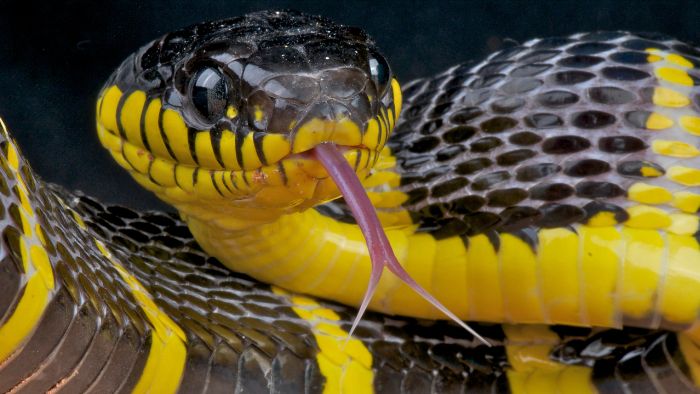
A Snake’s Sense of Smell
Snakes possess an extraordinary sense of smell that plays a crucial role in their survival. Their ability to detect scents in their environment is highly developed, allowing them to locate food, identify potential threats, and navigate their surroundings.
Snakes use their forked tongues to collect scent particles from the air, which they then transfer to a specialized sensory organ called the Jacobson’s organ or vomeronasal organ. This organ interprets scent information and helps the snake make critical decisions.
How Snakes React to Different Smells
The reactions of snakes to various scents are fascinating and diverse. Some scents can trigger a heightened state of alertness, while others might cause discomfort or aversion. Snakes can associate certain smells with danger or the presence of predators.
Conversely, some scents might signal a potential food source nearby. Understanding how snakes perceive and respond to different smells provides insight into whether vinegar could genuinely deter them.
The Potential Impact of Vinegar on Snakes’ Sense of Smell
When it comes to using vinegar as a snake repellent, the interaction between the vinegar’s pungent odor and a snake’s sense of smell becomes critical.
While vinegar’s strong smell might seem like a logical deterrent, it’s important to consider the extent to which it affects a snake’s olfactory abilities.
While some anecdotes suggest that vinegar might deter snakes due to its smell, the precise impact on their sense of smell remains a topic that requires further scientific investigation.
Effectiveness of Vinegar in Repelling Snakes: Case Studies and Experiments
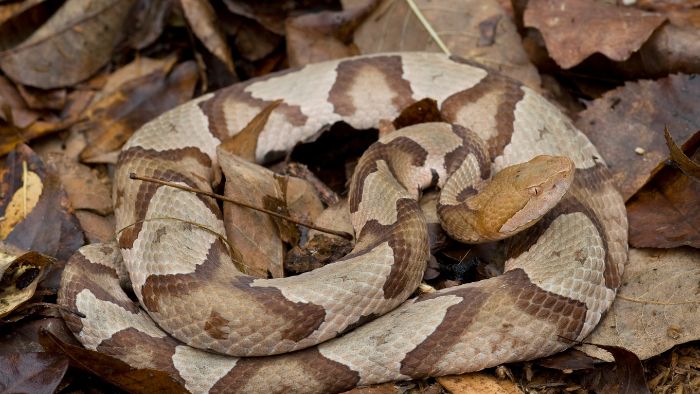
Case Studies of Individuals Using Vinegar as a Snake Repellent
Anecdotal evidence has led to the widespread belief that vinegar can repel snakes effectively. Many individuals share their experiences of using vinegar sprays around their properties and attesting to a decrease in snake sightings.
However, these accounts are often subjective and influenced by various factors, including local snake populations, environmental conditions, and the overall effectiveness of other preventative measures taken alongside vinegar application.
Experimental Studies Testing the Effectiveness of Vinegar
To bring more clarity to the debate, several experimental studies have been conducted to assess vinegar’s efficacy as a snake repellent.
These studies typically involve controlled environments where vinegar is applied to specific areas, and snake behavior is observed. Some studies report positive outcomes, suggesting that vinegar can deter snakes to some extent.
However, other studies show mixed results, indicating that factors such as the concentration of vinegar, snake species, and environmental variables play a role.
Analysis of the Results and Conclusions Drawn from These Studies
Analyzing the results of case studies and experimental research is crucial for drawing meaningful conclusions. While some studies suggest that vinegar has the potential to deter snakes, it’s important to consider the limitations of these studies.
The complexity of snake behavior, the diversity of snake species, and the variations in environmental conditions make it challenging to arrive at a definitive verdict.
As of now, the scientific community continues to explore vinegar’s role as a snake repellent, and ongoing research aims to provide more concrete insights into its effectiveness.
Other Natural Snake Repellents and Preventive Measures
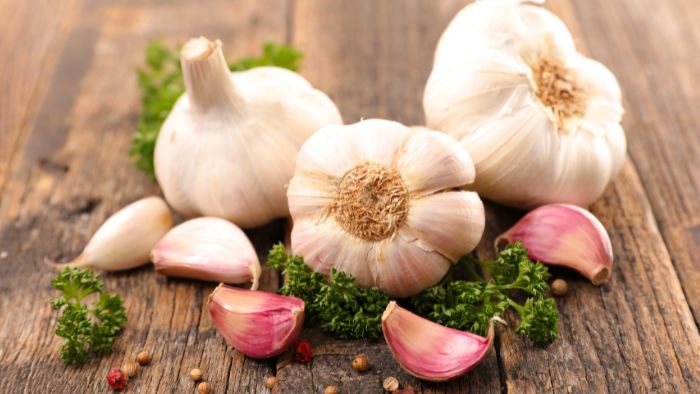
Alternative Natural Snake Repellents
While vinegar remains a topic of debate, there are several other natural substances that people have tried as snake repellents. These alternatives are worth considering if you’re exploring holistic approaches to keep snakes away from your property.
1. Garlic
Garlic, known for its pungent aroma, is believed by some to repel snakes due to its strong scent. People often crush garlic cloves or create garlic-infused sprays to spread around areas they want to keep snake-free.
However, like vinegar, scientific evidence supporting garlic as an effective snake repellent is limited.
2. Cinnamon
Cinnamon is another aromatic substance that some individuals use to deter snakes. Its pleasant smell might serve as a barrier against these slithering creatures.
It’s worth noting that cinnamon’s effectiveness as a snake repellent is mostly anecdotal, and its application should be combined with other preventive measures.
3. Essential Oils
Certain essential oils, such as clove oil, cinnamon oil, and cedar oil, are also considered by some as snake repellents. These oils are known for their strong scents, which might create an environment that snakes find less appealing.
As with other natural remedies, the use of essential oils requires careful application and should be accompanied by additional preventive actions.
Tips for Snake-Proofing Your Property
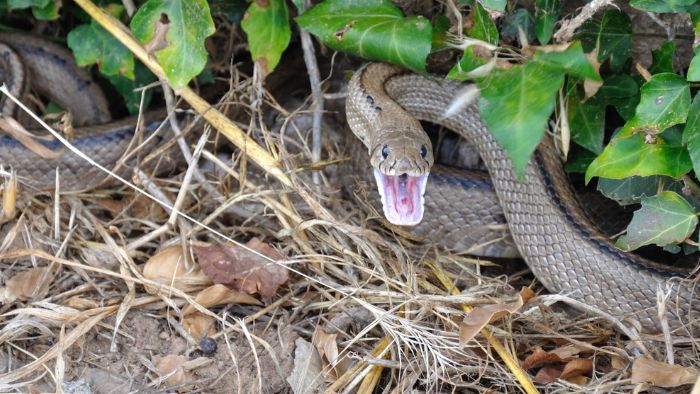
Regardless of whether you choose to explore natural repellents, taking preventive measures to snake-proof your property is a wise approach. Here are some practical tips to consider:
1. Removing Potential Snake Habitats
Snakes are attracted to areas with suitable hiding spots and food sources. To minimize their presence, keep your property clean and tidy. Remove clutter, piles of debris, and overgrown vegetation where snakes could potentially hide.
By eliminating these potential habitats, you make your property less attractive to these creatures.
2. Sealing Entry Points
Snakes can slip through surprisingly small openings. Carefully inspect your home and property for gaps in doors, windows, and walls. Seal any openings with appropriate materials to prevent snakes from entering.
This not only keeps snakes out but also helps with general pest control.
3. Using Snake Fencing
Installing snake-proof fencing around your property can be an effective way to keep snakes away. Snake fencing typically involves a combination of wire mesh and underground barriers to prevent snakes from slithering through or under the fence.
Professional installation is recommended to ensure its effectiveness.
Remember that combining multiple preventive measures is key to achieving the best results. While natural repellents might play a role, they are most effective when used in conjunction with habitat modification and other preventive strategies.
Safety Considerations and Precautions when Using Vinegar as a Snake Repellent

Potential Risks and Hazards of Using Vinegar
While vinegar is often considered a natural solution, it’s essential to be aware of potential risks and hazards associated with its use. Vinegar is acidic and can cause skin and eye irritation, especially in concentrated forms.
Moreover, using excessive amounts of vinegar in enclosed spaces might result in strong and unpleasant odors, affecting indoor air quality.
Precautions to Take When Using Vinegar as a Snake Repellent
To ensure safety when using vinegar as a snake repellent, consider the following precautions:
- Dilution: If you’re planning to apply vinegar around your property, dilute it with water to reduce its acidity. This can help prevent potential harm to plants and animals in the area.
- Protective Gear: When applying vinegar, wear protective gloves and eyewear to prevent direct contact with the solution. This is particularly important if you’re using a concentrated mixture.
- Proper Ventilation: If you’re using vinegar indoors, ensure proper ventilation to prevent the buildup of strong odors. Open windows and doors to allow fresh air to circulate.
Advice from Professionals on Safe Usage
For expert guidance on using vinegar or any other snake repellents, consult professionals who specialize in wildlife management and pest control. They can provide personalized recommendations based on your specific situation.
Additionally, they can help you navigate safety concerns and choose the most effective and safe methods to deter snakes from your property.
Other Methods for Snake Control and Removal

Hiring Professional Snake Removal Services
If you’re dealing with a persistent snake problem or encounter venomous species, it’s wise to consider hiring professional snake removal services.
Trained experts have the knowledge and tools to safely identify, capture, and relocate snakes without causing harm to you or the snake. Professional services ensure a humane approach to snake control and can provide valuable advice on preventing future infestations.
DIY Snake Control Techniques
For those who prefer a hands-on approach, there are several DIY snake control techniques to consider. These include using physical barriers like snake-proof fencing, sealing entry points, and reducing potential hiding spots.
However, DIY methods require a good understanding of snake behavior and proper execution to be effective.
When to Seek Professional Help
Knowing when to seek professional help is crucial. If you’re uncertain about snake species, lack experience in handling snakes, or if the infestation is beyond your control, it’s recommended to contact experts.
Professionals can assess the situation, provide safe removal, and offer guidance on preventing future snake encounters.
Remember that snake control and prevention require a balanced approach that considers both human safety and the well-being of these animals.
By staying informed and working with professionals when needed, you can create a living environment that minimizes the chances of snake encounters while promoting coexistence with wildlife.
Debunking Myths and Misconceptions

Snake repellents have garnered their fair share of myths and misconceptions over time. Let’s take a closer look at some of these myths and unravel the truth behind them:
Myth 1: A Single Repellent Works for All Snake Species
One prevalent myth is that a particular plant or substance has a universal repellent effect on all snake species. In reality, snakes exhibit diverse behaviors and preferences based on their species. What might deter one type of snake could have little to no effect on another.
It’s essential to recognize that the effectiveness of a repellent can vary widely among different snake species.
Myth 2: Natural Repellents Provide a Foolproof Solution
The notion that natural repellents offer a foolproof solution to snake infestations is another common misconception. While substances like vinegar, garlic, and essential oils might have some deterrent properties, they are not guaranteed to keep snakes away completely.
Snakes are adaptable creatures, and their behavior can be influenced by a variety of factors, including environmental conditions and the availability of food sources.
Myth 3: DIY Repellents Are Always Safe and Effective
The DIY approach to snake repellents might sound appealing, but it’s crucial to exercise caution. Some natural substances, like vinegar or essential oils, can have adverse effects when used improperly.
Concentrated solutions could cause skin and eye irritation, and excessive use might result in strong and unpleasant odors. Ensuring proper dilution and taking safety precautions is essential to avoid unintended consequences.
Myth 4: Repellents Work Without Other Preventive Measures
Believing that using a repellent alone will ensure a snake-free environment is another myth that needs addressing. Snake prevention requires a multi-faceted approach.
While repellents might play a role, they are most effective when combined with other preventive measures such as habitat modification, proper property maintenance, and sealing potential entry points.
Frequently Asked Questions about Vinegar and Snake Repellents
What Smell Do Snakes Hate the Most?
Snakes have different reactions to smells, but some odors that they might find aversive include strong essential oils like clove, cinnamon, and cedar. However, individual snake preferences can vary.
How Do Snakes React to Vinegar?
Vinegar’s strong scent could potentially disturb a snake’s sense of smell, making an area less appealing. Some snakes might avoid areas treated with vinegar, while others may not be as affected.
What Home Remedy Gets Rid of Snakes?
Home remedies like vinegar, garlic, and essential oils have been suggested as snake repellents, but their effectiveness is not guaranteed. A combination of these remedies along with habitat modification and professional guidance is recommended.
What Smells Attract Snakes?
Snakes are attracted to the scents of potential prey, such as rodents and small animals. Additionally, warm and sheltered spaces that provide suitable hiding spots can be attractive to snakes.
Conclusion
In the complex world of snake repellents and prevention, it’s crucial to navigate through a multitude of information, separating fact from fiction.
While natural remedies like vinegar, garlic, and essential oils might hold potential as snake deterrents, their efficacy remains a subject of ongoing research and debate.
Understanding snake behavior, habitat preferences, and the limitations of various repellent methods is key to making informed decisions.
As we’ve explored the science, myths, and practical considerations surrounding vinegar and other repellents, it’s clear that there is no one-size-fits-all solution.
A comprehensive approach that combines multiple strategies, including habitat modification, professional guidance, and safe repellent application, offers the best chance for success.
Remember, each snake encounter is unique, and what works for one situation might not work for another. Staying informed, seeking expert advice when needed, and fostering a harmonious coexistence with wildlife are the cornerstones of responsible snake management.
By dispelling myths, embracing knowledge, and adopting a holistic perspective, we can create environments where both humans and snakes can thrive while maintaining safety and balance.

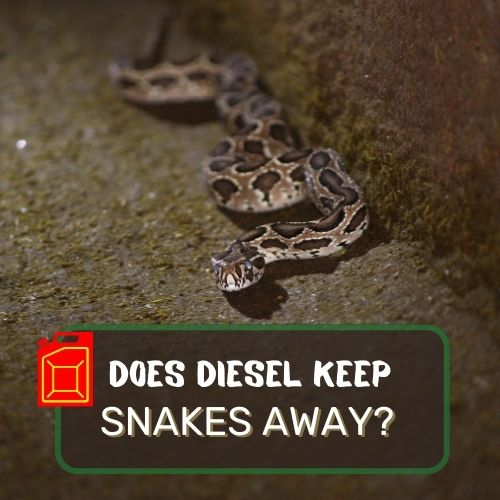
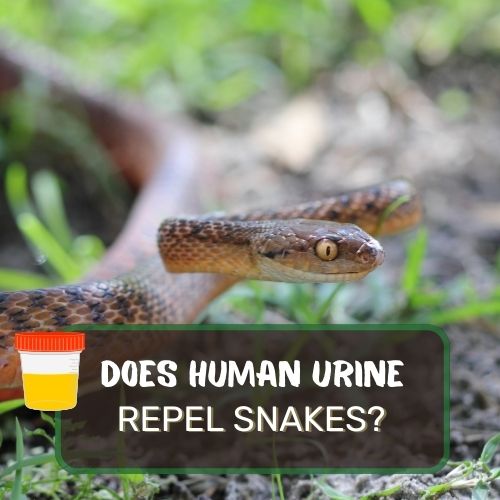
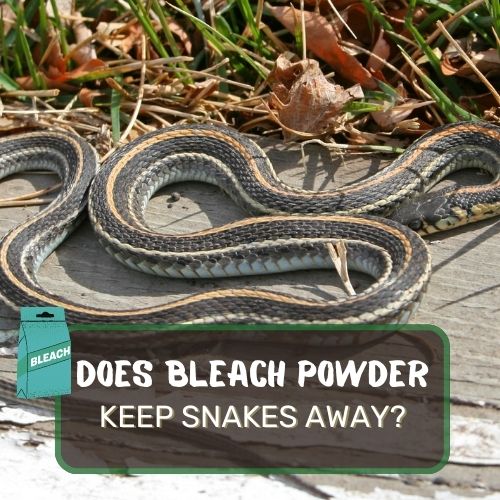
0 Comments